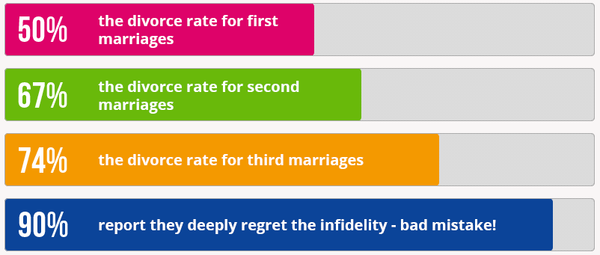Infidelity: Is the grass REALLY greener?

The numbers speak for themselves and the common beliefs about infidelity are just not true. Some cheaters say they are looking for love, others seek acceptance and others say they want to feel better. Some want all of the above. For most, something is not right in their life and often it is their partner who gets blamed. The affair partner is considered the new messiah and believed to be the only person capable of understanding the cheater and giving them what they need.
However, current statistics show that the beliefs held by the cheater are almost always part of what I refer to as “the great illusion”, a devastating force that has the potential to destroy families and unsettle innocent lives.
With every passing day people in the USA and Canada seem to be becoming more and more complacent to the impact of infidelity and as a result we are living in dangerous times. Infidelity and divorce are becoming more common place and more accepted than ever before. People report that 50% of current marriages will end in divorce, saying this as though it is as common as breathing. I find this frightening. Somehow we forget about the impact that either infidelity, or divorce has on people and forgotten is the experience of the millions of children who are forced to live without one of their parents full-time. We are creating a generation of “child victims” who are growing up with a different family experience and the problems will only continue to grow exponentially. This is a frightening truth that needs attention now and the first line of defense is you.
Just look at these statistics:

Is the grass really greener elsewhere? Is infidelity the panacea we should be looking for? Perhaps not, with 67% of second marriages and 74% of third marriages ending in divorce. This indicates that we do not get better at relationships with the number of times we get married. Practice makes perfect is just not true.
The adage, “if you don’t succeed, try, try again” is true but not necessarily with someone else. The numbers support the view that we should be trying, trying again with the person we are currently with, that being our spouse.
